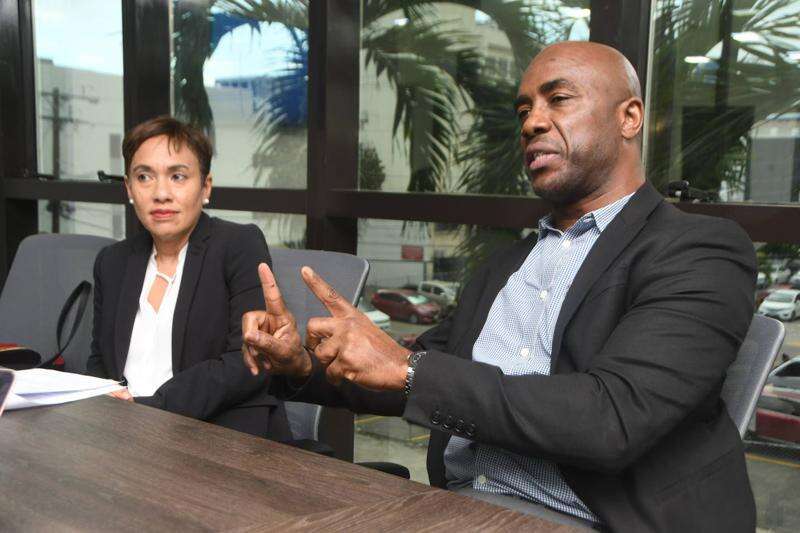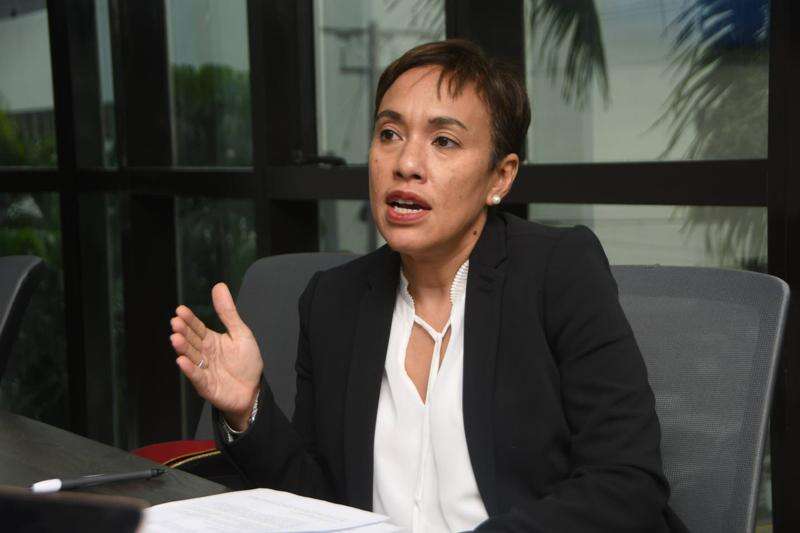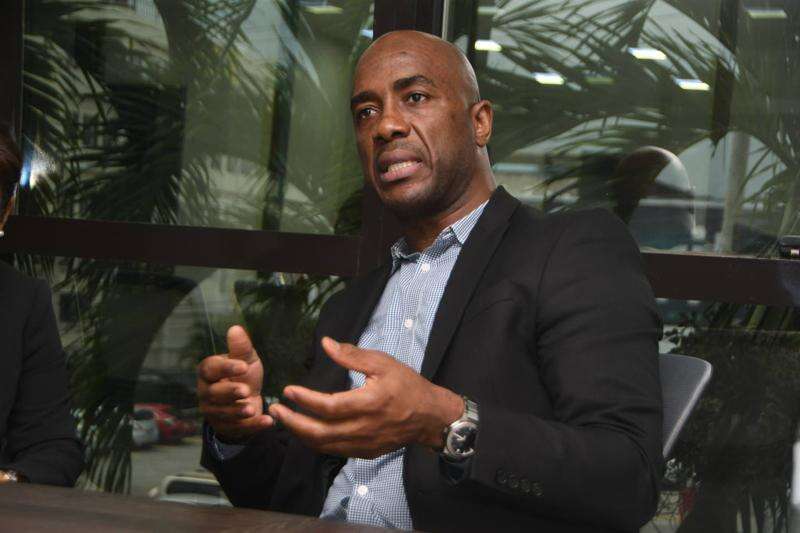Quantas Launch
One of Jamaica’s newest investment firms, Quantas Capital Group, founded by two former bankers, has secured backing from another member of the Hendrickson family.
Quantas, in which Dr Adrian Stokes and Jacqueline Sharp are founding partners – and both of whom once worked with Scotia Group Jamaica – had its official launch last week, six months into its start-up.
“Kevin Hendrickson, an investor in our business, and Matthew Lyn, also from the Hendrickson family, are investors in Quantas. They’re strategic partners,” said Stokes, adding that institutional investors have also been taking positions in the company for which he is the chief executive while Sharp is chairman.
The Companies Office of Jamaica records show that Lyn is a director of Quantas Capital Limited alongside Stokes, Sharp, Denise Williams and Oliver McIntosh. He is also a director in a second member of the group called Quantum Investments Limited, alongside Stokes and Sharp. Meanwhile, Kevin Hendrickson sits as a director of a third outfit called Quantas Investment Management Limited ,alongside Stokes, Sharp, Williams and McIntosh. Lyn is CEO of the large poultry company CB Group, while Hendrickson owns several hotels in Kingston and Montego Bay and operates the Yummy Bakery and other businesses.
Through Quantas Advantage, the company raised close to $3 billion on the debt market last September, one of the largest capital raises in that year. Within 18 to 24 months, or by December 2024, Quantas Group also plans to float shares in Quantas Advantage through an initial public offering on the Jamaica Stock Market.
“Investors like what they see at Quantas, and they have backed us,” Stokes said.
The individual positions taken by investors was not disclosed.
Through the private placement last year, investors were invited to buy shares in Quantas Advantage, and the proceeds have been used to structure deals revolving mostly around monetising future cash flows or doing advance payments on receivables. Stokes says that, for the receivables they buy, Quantas will package those items into tradable securities.
“That is one of the innovations that we are bringing to the market – a thing called asset-backed securities,” Stokes said, adding that, while such securities are not uncommon in the global arena, they are relatively new in the Jamaican and regional market space.
“What we want to do is to develop the market for asset-backed securities in Jamaica and the region,” he added. “We will free up and transfer capital to SMEs and, by so doing, we will give investors an opportunity to participate in that.”
He would not be drawn on the rates of return being offered on Quantas Advantage, saying only that his company was prepared to outdo what currently obtains in the market. Checks with industry players indicate that rates of return being offered in the market at this time are in the region of seven to 8.5 per cent.
Quantas’ strategy to purchase different types of cash flows also includes lease income.
“If you have a lease agreement on property you own and you receive lease income over time, we can buy that stream of income from you and give you all of that cash up front,” Stokes said, adding that the company has products that take into account the varying risk appetites that exist among investors.
“We are able to structure solutions that will meet the risk appetite for investors who are conservative. We can also create solutions that meet the risk appetite of investors who want to take on some more risk. We have the flexibility to create investment options across the risk spectrum,” he said.
Thank you very much Garth.
Allow me to acknowledge our Minister of Education, Fayval Williams, and, allow me as well to express a few thoughts on the co-founders of Quantas.
Now, when Adrian took the stage and he started to pace, it reminded me of a lecturer in a classroom and he delivered probably one of the best explanations I have heard so far of the actions of the FEDS in the United States, I have not heard a better explanation. And so immediately I said, you know, I need to participate in whatever offerings they have and then I remember that I don’t have much with which to participate but that was how good he was. And I’m certain based upon the response that many of you thought so as well, that clearly Adrian knows the financial craft very well and that is usually a good sign and a good basis on which to make judgment and determination regarding these financial institutions.
And I was, before taking the stage, making the point to both Adrian and Jackie that they come from a good school. They are alumni of one of our oldest banks, Scotia Bank and therefore you would have… Financial intermediation is a good sign of a developing economy. It’s a signal of increasing complexity in the economy and the more financial intermediation you get, firms like Quantas coming into the marketplace, the greater will be the allocative efficiency in your economy. Capital, which is stuck somewhere in an underperforming or underutilized asset, or in an asset class where it is just not doing what it could do, now gets an opportunity to be unlocked and channeled into areas where it can yield greater results. So I’m always very to see more financial intermediation coming into the market.
Why has this happened? It is happening because one, there is greater policy stability in our economy and that’s probably the main reason. When the budget is read each year, there is not so much trepidation and worry that there will be unprecedented policy shifts, new taxes to contemplate, and new changes in regulations to contemplate. For the last seven years, there has been significant stability in our financial markets and in our economy. So policy stability is one reason.
Now I’m not here to make a political commercial for the policies of the government, but if you interpret it so, I’m happy. The second reason for the emergence of greater financial intermediation would be the regulatory environment and having had the experience of FINSAC and having gone through to strengthen our regulatory environment, but more than that in the last few years, to not just strengthen, but to deepen it, make it more appropriate for the times and indeed, we have taken actions such as creating an independent central bank and that has created the environment in which financial intermediation can grow, that entrepreneurs can truly plan and take risks and develop firms such as Quantas but there is also another reason, and that is there is an increasing demand for investment funds.
In the last uh, decade, we could say there is an increasing appetite for investments in Jamaica, and we are seeing that expressed in investment in infrastructure, we’re seeing it expressed in investment in construction and housing and real estate market in particular, we are seeing that in the expansion of BPOs, we are seeing that in the expansion of several other industries, so there is a demand for the services that Quantas will supply.
Generally, this paints a very good story for Jamaica, a story that is not told very often and not explained as widely as it should be for the general public to understand the rebirth of Jamaica, the resurgence of Jamaica within the region, the growth and development of Jamaica will start with our financial industry- well not will, has started with the growth of our financial industry.
When we look at our CARICOM region, clearly Jamaica has the strongest financial market, and when I talk to friends and colleagues in Trinidad and in Barbados, they look at Jamaica with great admiration, and they want to come and participate in Jamaica’s market and that in itself is a good sign and that ought to be encouraged. And I’m saying this to say to Quantas that your marketplace should not only be Jamaica and that you ought to be looking regionally because there is a market to be served regionally.
Jamaica’s economy grew by 5.9% in the third quarter of this financial year. This would be our sixth consecutive quarter of growth, that’s significant and this is coming against overlapping crises. The pandemic, which we have all seemed to forgotten about, the increase in prices, shipping prices that we had, the supply chain crisis, but Jamaica has done this amazing thing that we have recovered quickly and we are growing but more than that, we now have the lowest unemployment rate in our history. It’s not as low as the United States, but we’re getting there and the truth is that in another year or two, we probably will get closer to full employment in Jamaica which creates its own problems, but it’s a good problem to have, to have all our people employed. Yes, it will have an impact on wages and there are other issues as well that it will raise, but it’s a good problem to have.
The truth is, we have never had that contemplation or consideration before in the history of Jamaica. Our economy is strong, still many challenges, but the core of the economy is strong, and the recovery is also very strong. It’s strong to the point where
Jamaica would be considered to access the Resilience and Sustainable Facility of the IMF. This is a powerful signal of the strength of the fundamentals of Jamaica and this Facility will allow us to access up to 763 million US dollars at an interest rate of approximately 3.8% with a repayment period of 20 years with no principal repayment for the first 10 years.
Yes, this is amazing. The countries that qualify for this clearly would be countries that have strong economic fundamentals. In addition, we took the decision to access the IMF’S Precautionary Liquidity Line, which is an instrument offered by the IMF to countries with very strong economic fundamentals. So, although we have enough reserves, the government is being prudent even though our fundamentals are strong, even though we are growing and it is showing in our employment rate, we are continuing our policy of prudence, so we are taking out this insurance policy nonetheless which further strengthens the fiscal outlook, strengthens how the government is perceived and how investors perceive current conditions and future conditions. So, in the event of any shocks to our economy, we have enough buffers in place to maintain stability which gives you, many of you here are principals of financial institutions, which gives that added comfort.
So, I wanted to make the between Quantas launching its services today and government policy. Government policy is working and it is creating the basis and the opportunities for firms and entrepreneurs to take risks, to invest, and to continue to grow our economy but there are other policies which I think would be very useful, very helpful to firms like Quantas, which we need to move with greater speed and alacrity and now I’m talking about JIFSA.
Some of you would know that the Jamaica International Financial Services Authority, (JIFSA), which is a statutory body which was established in 2011 with the primary role of promoting and marketing Jamaica as a jurisdiction for international and financial business services, that this agency has done quite a bit of work so far in creating this new domain for Jamaica as an international business and financial centre. For example, we have passed the Trust and Corporate Services Providers Act and the associated regulations which were a gazetted in April 2022 and this Act seeks to promote and maintain high standards of conduct, ethics and competence in the provision of international, corporate and trust services, and it allows for the professional service providers to act as a fiduciary intermediary between their clients and the Company’s Office.
This piece of legislation creates even more opportunities for firms like Quantas or other firms that are operating in the financial space to take advantage of this regulatory environment. Under JIFSA we passed the Partnership General Act in 2017 and its associated regulations. We also passed the Partnership Limited Act in 2017 and associated regulations and there are other legislations which we are contemplating, and the Trust Act as well was passed in 2019, which replaced the outdated Trustee Act and updates the trustee’s duties.
Now, all of this goes towards creating Jamaica as an international financial and business centre, which further compliments the activities of Quantas, giving greater vehicles through which your services can be executed. So again, government policies at play. It is not yet a complete framework. There is still some fine-tuning to do especially to ensure that it aligns with international financial regulations but this is being done and so I want to point out to those of you gathered here today, that there is still the intention of the government to create, promote, and develop Jamaica in the international business space in a way that is compliant with international financial obligations and regulations.
So, ladies and gentlemen, it is indeed my great pleasure to have been here to participate in this launch. I see this as a further positive sign of Jamaica’s economic recovery and a further sign of the strength of Jamaica’s financial and capital market. Ladies and gentlemen, Happy New Year and congratulations to Quantas.
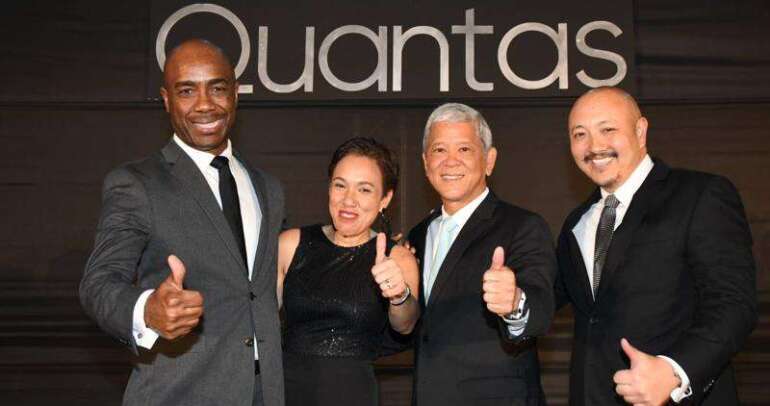
On Wednesday, January 11, 2023, the who’s who in Jamaica’s financial and business community came out to celebrate the launch of the country’s newest financial entity, the Quantas Financial Group. The company, which started operating last June, is projected to grow assets under management to over $3 billion in its first year. The firm which is led by a robust strategic and investment management structure including former president and CEO of Scotiabank Group Jacqueline Sharp, along with CEO Dr Adrian Stokes, is backed by a solid group of investors. Speaking at the official launch of Quantas at the Jamaica Pegasus in Kingston, the CEO stated that the launch is a key step to bringing first-class investment solutions to investors.
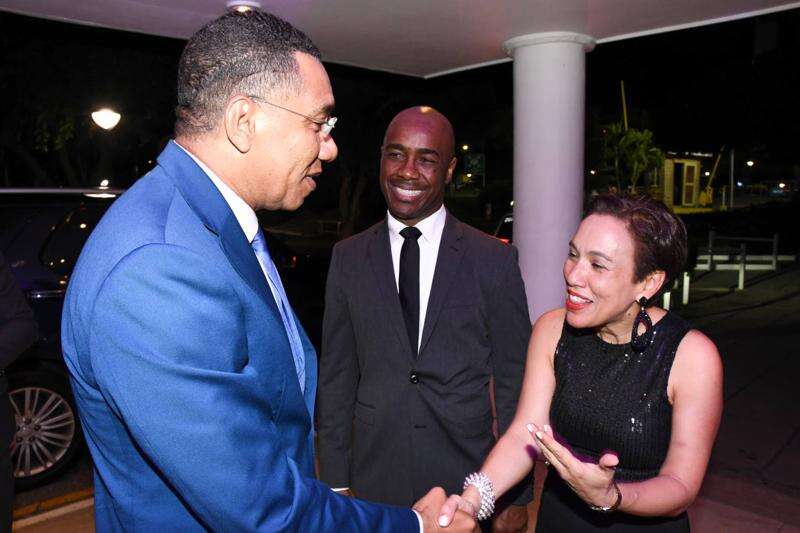
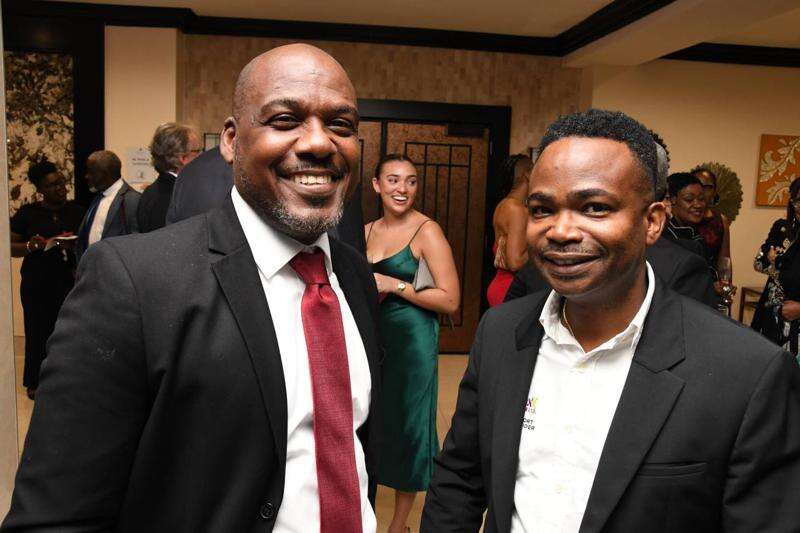

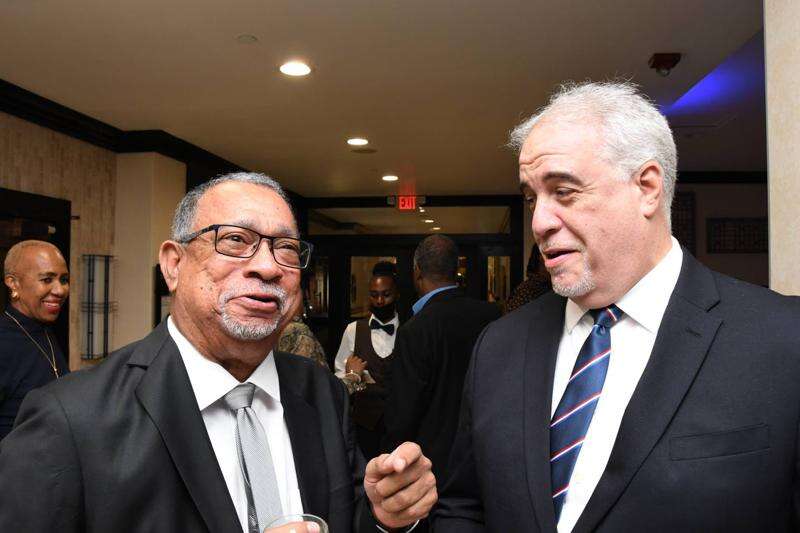

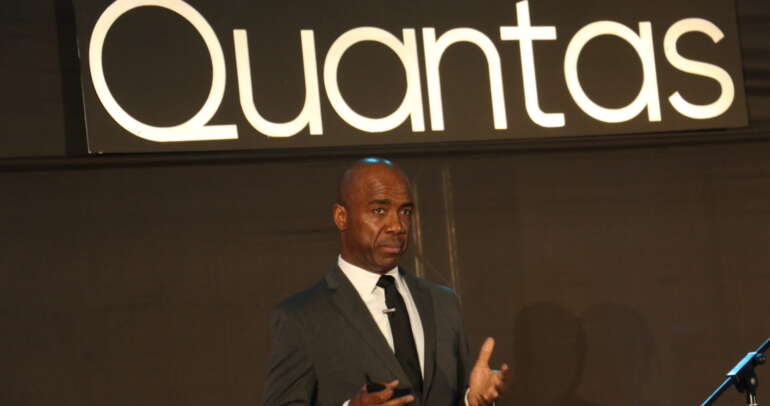
Quantas Financial Group, an alternative asset management solutions company, was formed by an experienced group of bankers and business leaders to cut their own path on the Caribbean investment landscape.
Dr Adrian Stokes, a well-respected banker who also heads the Private Sector Organisation of Jamaica’s (PSOJ) Economic Policy Committee, is a board member of the Development Bank of Jamaica and a former senior vice president and head of insurance and wealth management at Scotia Bank Jamaica, is the CEO and conceptualiser of Quantas.
Other founders are former president and CEO of Scotia Group Jamaica Jacqueline Sharp, who is a director of Coffee Traders Limited and a vice president of the PSOJ; CEO of The CB Group, Matthew Lyn; and Kevin Hendrickson, managing director of Courtleigh Hospitality Group.
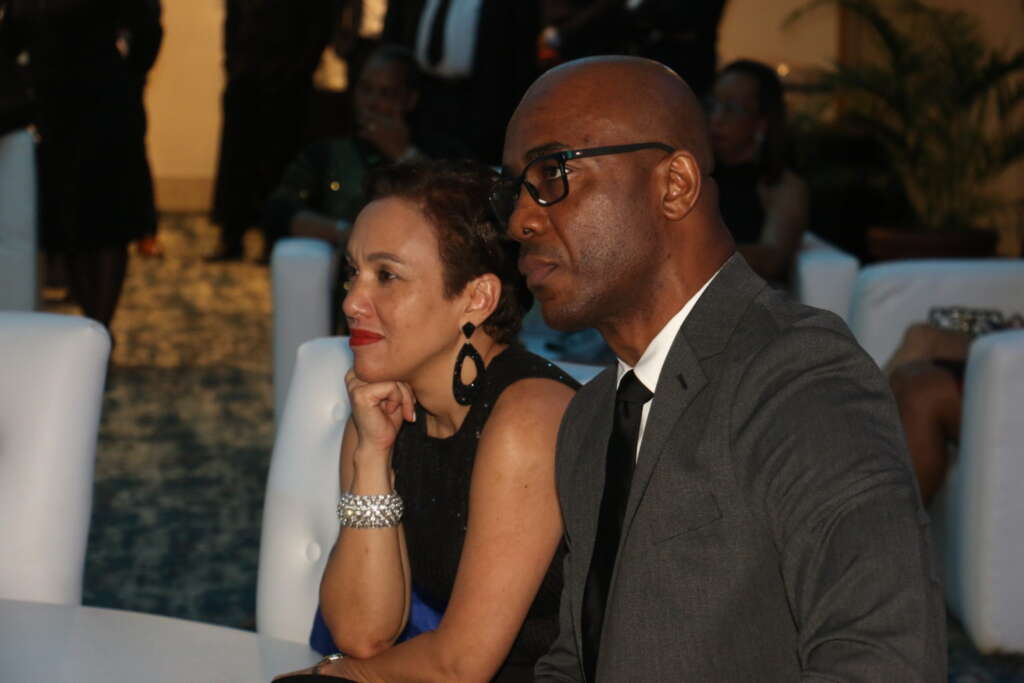
Both Stokes and Sharp discovered gaps in the asset management offerings by major banking houses and seized upon the opportunity to fill them.
The credibility of the founders is second to none – they are not dilettantes looking to make a quick buck who are way over their heads.
Stokes explained that Quantas was formed to solve two main problems.
Quantas is an alternative asset management business. We create alternative management solutions for investors, giving them opportunities to truly divest their portfolios. – Dr Adrian Stokes, co-founder of Quantas
“The first we encountered during our time at the bank was a limited opportunity to diversify portfolios. While we have the traditional bonds, cash, equities market, real estate – beyond those traditional offerings, the opportunity to diversify and produce quality risk-adjusted returns was limited.
“Second, it is difficult for businesses seeking flexible capital. Believe it not, the more flexible the capital, it signals a red flag. It is not so much about flexible capital as it is trusted capital.
“We created Quantas to solve these two big problems in the Caribbean. Quantas is an alternative asset management business. We create alternative management solutions for investors, giving them opportunities to truly divest their portfolios.”
This new vehicle is designed to give investors the means to be in touch with capital in what is now an agile environment.
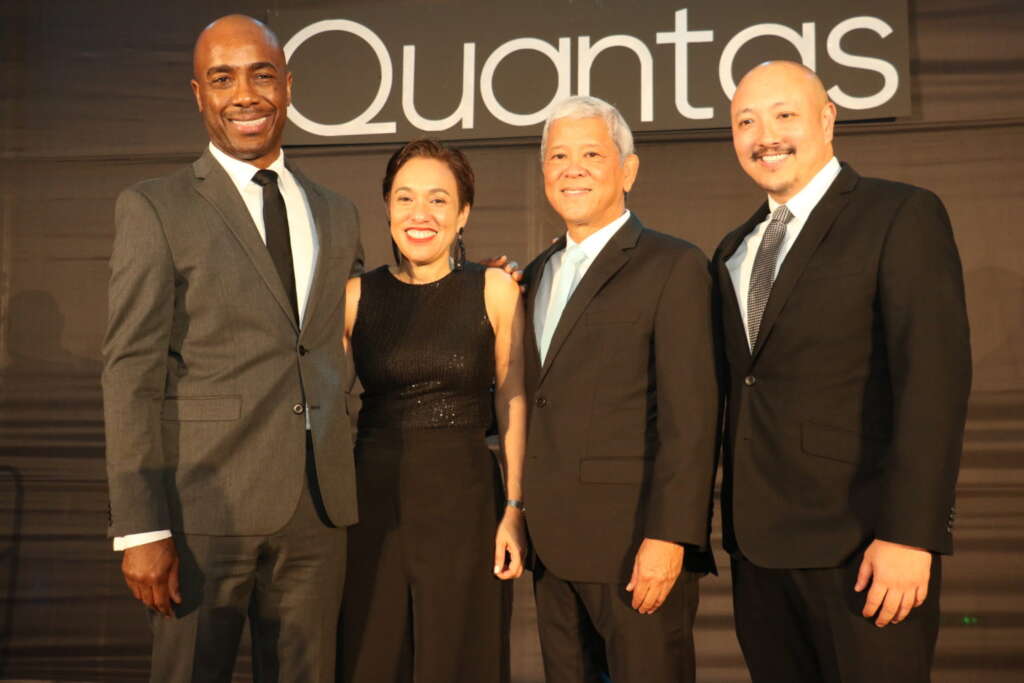
Stokes stressed that Quantas is built on core principles and will be doing business the right way with its watchword being integrity. This is prescient coming the day before it was announced that sprint king Usain Bolt discovered funds missing from his account at a local finance house.
Quantas’s solutions come under three headings:
- Structured products ( In October of last year it launched Quantas Advantage which targets receivables and other contractual cashflows in the Caribbean)
- Real assets
- Strategic opportunities
The company is aiming to also attract medium-sized entities looking for a trusted partner with Quantas bridging gaps and focused on solving problems.
“Investors can look forward to creative solutions we will be bringing to markets,” said Stokes.
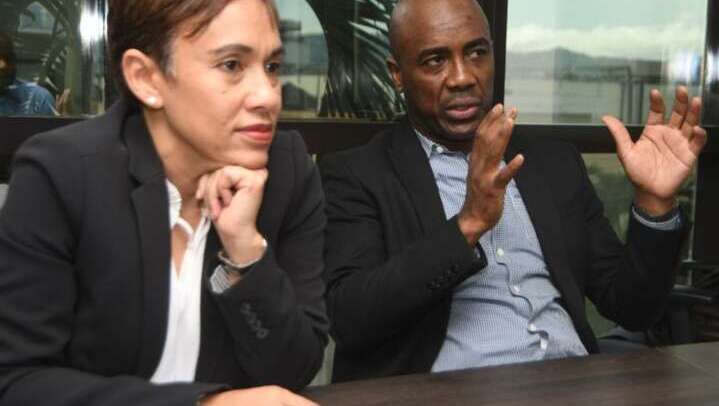
FORMER Scotia Group President and CEO Jacqueline Sharp, and financial economist Dr Adrian Stokes have launched Jamaica’s newest financial entity, Quantas Financial Group, aiming to “open up the menu” of options available to investors.
“Officially, Quantas Financial Group started operations about four months ago,” Stokes, who will operate as the entity’s chief executive officer, told the Jamaica Observer in an exclusive interview. Stokes, who is the former head of wealth and insurance at Scotia Group Jamaica, left that post in February. At the time, the Scotia Group in a release to the Jamaica Stock Exchange said he was “leaving the business to pursue other opportunities”.
Those opportunities it turns out is a push into the market for contractual cash flow, including but not limited to, trade receivables — a market Stokes said has been conservatively estimated at US$4 billion ($600 billion).
“We are looking to give investors the ability to invest in a vehicle that does securitisation. So effectively, what this vehicle does, it purchases different cash flows/receivables, packages or securitises these receivables to create new securities, and then sell these securities to end-users like pension funds, insurance companies or accredited individual investors who are concerned about credit and other major market risks in the current market environment. In doing so, investors earn a return from the profit that we make,” the Quantas Financial Group CEO outlined.
The first investment solution from Quantas as indicated is a securitisation vehicle.
“We have various types of trade receivables looking at right now. We have a very big pipeline of over US$140 million right now,” he added.
“What we are doing is not completely novel and new. It’s just new to our market,” Sharp who is the board chair for the Quantas Financial Group outlined. Sharp, who left the Scotia Group in October 2017 to join her family business, added: “These are things that are happening in more sophisticated developed markets. If you look at the US, for example, that market is about US$14 trillion, a huge market for receivables financing. In the Caribbean and Latin American region, we’re looking at about US$1.5 trillion and we are estimating that Jamaica is about US$4 billion ($600 billion),” she continued.
“That’s just from data that are publicly available,” Stokes chipped in highlighting that there are much more receivables that are not publicly known which presents a “big-big opportunity”.
Outside of the US treasuries, it is the biggest section of the market, he noted. According to Securities Industry and Financial Markets Association (SIFMA), the US treasuries market is valued at US$46 trillion.
Sharp and Stokes say the motivation behind starting Quantas is to improve the allocation of capital in Jamaica and across the Caribbean.
“The financial markets in our region are still at an early stage of development. Many good investment ideas never get started because they lack access to capital. Therefore, economic growth and development in our region is relatively low. Economic development in our region will be given greater impetus as our financial markets develop and improve the allocation of capital. Quantas was formed to continue the development of the financial markets in our region, and by doing this we will help create solutions for a better Caribbean and a better world,” they outline.
Quantas Financial Group itself is made up of three entities — Quantas Capital, Quantas Investments and Quantas Management. “The name of the company actually derives from the Latin word quantus, which means, how great,” Stokes pointed out. “Then we work with our marketing team to come up with Quantas, which is a play on the word quantus.”
So far, it targets asset-backed securities (ABS) which are financial investments that are collateralised by an underlying pool of assets—usually ones that generate a cash flow from debt, such as loans, leases, credit card balances, or receivables.
“Effectively, what we focus on is providing investors with non-traditional financial solutions. As you know, you have your regular bonds and equities and repos which are your traditional investment solutions. What we do, we provide investors with additional asset classes so that they can diversify their investment portfolios,” Stokes added as he noted that he didn’t want Quantas Financial Group to dabble in the market where other entities “are already doing a good job”.
Asked if the company intended to diversify from that market, Stokes replied: “There are different types of solutions that we will bring. We don’t want to say too much at this stage apart from the opportunity we have in the market now, which is the securitisation vehicle. Importantly though, a key part of what we do, we innovate. We do no replicate existing investment opportunities. We believe the guys in the market are doing a very good job with the various opportunities that are available. So, we are not intending to create replicas of the existing opportunities in the market. So, importantly what you will see just like this new investment opportunity that we have in the market, it’s going to be new, it’s going to be innovative and importantly it is going to provide investors with a diversification of opportunities, different from what exists in the market.”
“We think it is an exciting opportunity for us because we saw the need. I certainly saw [the need] while I was at Scotia and, of course, Adrian would have seen it more in his recent role as the head of investments and insurance at Scotia,” Sharp added. “The reality is that there are pension funds and institutional investors who have cash and very few options to invest those funds, and so at the same time at the other end you have people who need financing, especially on the longer end which banks typically cannot fund, and they need creative structures. So really what this company is about is being in the middle and pulling the two together,” the Quantas chair explained.
Stokes was, however, quick to point out that while the company is going after receivables, “we’re looking at those receivables that are good receivables. It’s not just any receivables, because we have a very strict risk management architecture that allows for us to choose quality receivables.”
“When we talk about receivables, we are using the term in a very general way because it includes different types of cash flows. You’re talking about leases, for example. So if you’re a company and you have built commercial real estate, and you have tenants that have, rented these shops from you, and they have lease payments that are due over the next three, four, five years, we can buy those leases off the developer or the owner, and pay them cash, which they can go and reinvest into new areas or new projects, etc. So it’s not just your traditional trade receivables, its any type of contractual cash flow.”
“Anything that you put as contractual cash flows that we can understand and it can pass through our conservative risk metrics, then that will be a candidate for us to securitise.”
Sharp added: “These businesses must have strong, predictable cash flows, contractual cash flows that we can understand. We can understand the history, we can do our due diligence on the counterparty for those receivables. In other words, if you have a building that you have leased to someone, we want to understand who is a person that you have leased to? Are they of good character? Do they normally pay on time and so on. What is their business model that shows they have the ability to meet these contractual cash flow.”
So far, the Quantas Financial Group has pulled together an impressive listing of financial gurus to lead the drive. Apart from Stokes who is the CEO, the team is made up of Stanley Thompson, who is the executive vice-president for product innovation; Sitarah Smith, executive vice-president for treasury services; Layne Atkinson, executive vice-president for risk management; Cherice Lee, vice-president of operations; and Franklyn Anderson, vice-president of product innovation. Stokes said the aim is to increase the number of employees to 15.
While he didn’t say how much money was used to capitalise the entity, he did point out that hotelier Kevin Hendrickson and CEO of the CB Group Matthew Lyn are key strategic partners. Both are directors of Quantas Financial Group along with Oliver “Ollie” McIntosh, the founder and president of Verticast Media Group, and Denise Williams, a former senior vice-president for communications at Cable & Wireless. Sharp and Stokes are the other board members.
“We want to collaborate with existing players. We see ourselves as collaborators. In other words, most if not all of the things that we create, we will be able to work with the existing players in the market. For example, on the pension fund side, one of the things that we will do is to give them additional opportunity to diversify their portfolios. Right now most of what they have are bonds, equity, real estate and pension funds and their investors are in need of additional asset classes to properly diversify their portfolios.”
But the company is not only targeting Jamaica. Sharp and Stokes have their eyes set on the Dominican Republic and Trinidad already.
